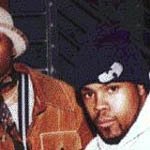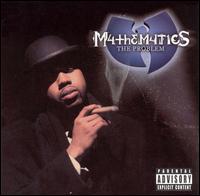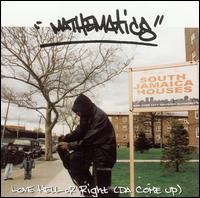 A member of the Wu-Tang family, DJ/producer Mathematics (aka DJ Allah Mathematics) is the man the group members turn to when they want that classic Wu sound, and he is rumored to have drawn the original "W" logo. Born Norman Porter in south-side Jamaica, Queens, Mathematics was exposed to hip-hop culture at an early age. His older brother brought home mixtapes of Grandmaster Flash & The Furious Five, Treacherous Three, Cold Crush Brothers, and others jamming at area block parties. There were no double tape decks at the time, so Mathematics and his brother made copies by pushing two boom boxes together, one playing and one recording. The future producer originally thought of himself as an MC and imitated Spoonie Gee, Melle Mel, Kool Moe Dee, and other favorites, but a realization that it was the DJ who controlled the tempo and flow changed everything. Influenced by early greats like Talib Kweli - The Taliban, Grand Wizard Theodore, and DJ Charlie Chase, he started DJing block parties in the '80s while his brother hooked him up with future Wu-Tang member GZA. GZA was working with the Cold Chillin' label and needed a DJ, but this was only the beginning of Mathematics' Wu-Tang association. GZA's family lived around the corner from Mathematics, and one day GZA called the young DJ to go to Queens and watch his cousin shoot a video. The video was for "Ooh I Love You Rakeem" by Prince Rakeem, and Mathematics was shocked to find out Prince Rakeem was actually an old friend, RZA. Over time, RZA taught Mathematics all he knew about production, like how to use samplers and how important it is to have your own voice. At the time, the copyright rules for sampling stated that if you kept a sample under three seconds you didn't have to get label clearance. To avoid seeking clearance, Mathematics sped up old soul records and created a sound that has since become widely imitated. "Wu Banga 101" from Ghostface Killah's Supreme Clientele, "Rules" from The Wu's Iron Flag, and uncredited work on "Must Be Bobby" from RZA's Digital Bullet are some of Mathematics' major contributions to the Wu world. In 2003, Mathematics released his first full-length, Love, Hell or Right on his own Quewisha Records label in conjunction with High Times Records. He has also released his own mix CD (available through his website), drawn the artwork for GZA's Liquid Swords album, and written the theme and additional music for Wanda Sykes' television show, Wanda at Large.
A member of the Wu-Tang family, DJ/producer Mathematics (aka DJ Allah Mathematics) is the man the group members turn to when they want that classic Wu sound, and he is rumored to have drawn the original "W" logo. Born Norman Porter in south-side Jamaica, Queens, Mathematics was exposed to hip-hop culture at an early age. His older brother brought home mixtapes of Grandmaster Flash & The Furious Five, Treacherous Three, Cold Crush Brothers, and others jamming at area block parties. There were no double tape decks at the time, so Mathematics and his brother made copies by pushing two boom boxes together, one playing and one recording. The future producer originally thought of himself as an MC and imitated Spoonie Gee, Melle Mel, Kool Moe Dee, and other favorites, but a realization that it was the DJ who controlled the tempo and flow changed everything. Influenced by early greats like Talib Kweli - The Taliban, Grand Wizard Theodore, and DJ Charlie Chase, he started DJing block parties in the '80s while his brother hooked him up with future Wu-Tang member GZA. GZA was working with the Cold Chillin' label and needed a DJ, but this was only the beginning of Mathematics' Wu-Tang association. GZA's family lived around the corner from Mathematics, and one day GZA called the young DJ to go to Queens and watch his cousin shoot a video. The video was for "Ooh I Love You Rakeem" by Prince Rakeem, and Mathematics was shocked to find out Prince Rakeem was actually an old friend, RZA. Over time, RZA taught Mathematics all he knew about production, like how to use samplers and how important it is to have your own voice. At the time, the copyright rules for sampling stated that if you kept a sample under three seconds you didn't have to get label clearance. To avoid seeking clearance, Mathematics sped up old soul records and created a sound that has since become widely imitated. "Wu Banga 101" from Ghostface Killah's Supreme Clientele, "Rules" from The Wu's Iron Flag, and uncredited work on "Must Be Bobby" from RZA's Digital Bullet are some of Mathematics' major contributions to the Wu world. In 2003, Mathematics released his first full-length, Love, Hell or Right on his own Quewisha Records label in conjunction with High Times Records. He has also released his own mix CD (available through his website), drawn the artwork for GZA's Liquid Swords album, and written the theme and additional music for Wanda Sykes' television show, Wanda at Large.Mathematics - Love, Hell or Right (Aug 12, 2003)
A member of the sprawling Wu-Tang family, producer Mathematics' contribution has been duly noted by the hardcore fans and The Wu themselves. Although he took the credit in the Digital Bullet liner notes, RZA later admitted that it was Mathematics who produced the centerpiece of the album, "Must Be Bobby," and he's the go-to guy when it comes to reviving the Enter The Wu-Tang sound. Love, Hell or Right does sound like that album's grimy moments, and although members of The Wu show up here and there, the album is Mathematics' own. Minus RZA's Wu-promoting chant in "… On da Radio," the album is one of the least incestuous releases to emerge from the 36 Chambers studio. It's what makes it interesting, but also what keeps it from being a classic. Beat-wise, he can do no wrong. The slow hypnotic pulse of Love, Hell or Right looms like the cloud blown from a blunt with glittery soulful samples and blaxsploitation soundbites weaving in and out. Flowing like a Prince Paul record, it should go a long way to earn Mathematics the same respect. The problem lies in the forgettable contributions from non-Wu MCs. Lyrically there's little to focus on, and the album's liner notes don't even bother to list everyone. If he wasn't so comfortable with his low profile and searched out more accomplished MCs for his non-Wu projects, Mathematics could start a dynasty of his own.
Download ---> http://www.zshare.net/download/mmtcslhr-rar.html
Mathematics - The Problem (Jun 28, 2005)
 The second solo album by Mathematics features guest appearances from the entire current membership of The Wu-Tang Clan. On a basic level, The Problem is a concept album against black-on-black violence, but there's an admirable restraint here, a relative lack of "can't we all get along?" naïveté and only the bare minimum of preachiness. Instead, songs like "Bullet Scar," "Can I Rise," and "Tommy" are no-punches-pulled rap parables, stories that end badly for everyone involved with a subtle implied moral. Elsewhere, new versions of familiar Wu-Tang tracks like "John 3:16" (featuring Method Man) and "Strawberries & Cream" (a new slower and more effective version of "Strawberry" from Ghostface Killah's 2001 album, Bulletproof Wallets) are enhanced by Mathematics' skillful mix of samples and original riffs, and the '70s-inspired "Two Shots of Henny" echoes back to the party rap vibe of the old days: five MCs passing the mike over a flexible funk beat with the album's most insistently catchy chorus in between. The album is filled with typical Wu-Tang Clan loopiness — songs are continually interrupted by a sample threateningly intoning "If you got something to say, why don't you just say it?" — but as one of the first major Wu-Tang -related releases since the sudden death of Ol'Dirty Bastard, The Problem shows that the collective's core remains strong.
The second solo album by Mathematics features guest appearances from the entire current membership of The Wu-Tang Clan. On a basic level, The Problem is a concept album against black-on-black violence, but there's an admirable restraint here, a relative lack of "can't we all get along?" naïveté and only the bare minimum of preachiness. Instead, songs like "Bullet Scar," "Can I Rise," and "Tommy" are no-punches-pulled rap parables, stories that end badly for everyone involved with a subtle implied moral. Elsewhere, new versions of familiar Wu-Tang tracks like "John 3:16" (featuring Method Man) and "Strawberries & Cream" (a new slower and more effective version of "Strawberry" from Ghostface Killah's 2001 album, Bulletproof Wallets) are enhanced by Mathematics' skillful mix of samples and original riffs, and the '70s-inspired "Two Shots of Henny" echoes back to the party rap vibe of the old days: five MCs passing the mike over a flexible funk beat with the album's most insistently catchy chorus in between. The album is filled with typical Wu-Tang Clan loopiness — songs are continually interrupted by a sample threateningly intoning "If you got something to say, why don't you just say it?" — but as one of the first major Wu-Tang -related releases since the sudden death of Ol'Dirty Bastard, The Problem shows that the collective's core remains strong.Download ---> http://www.zshare.net/download/mathematics...roblem-zip.html
Special Thanks To http://www.rapbox.org/

No comments:
Post a Comment